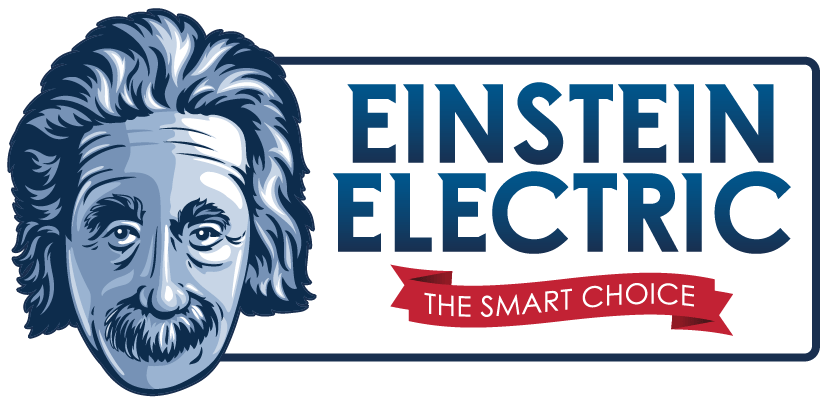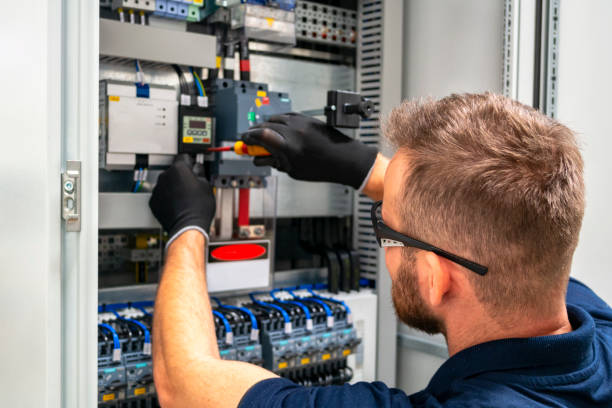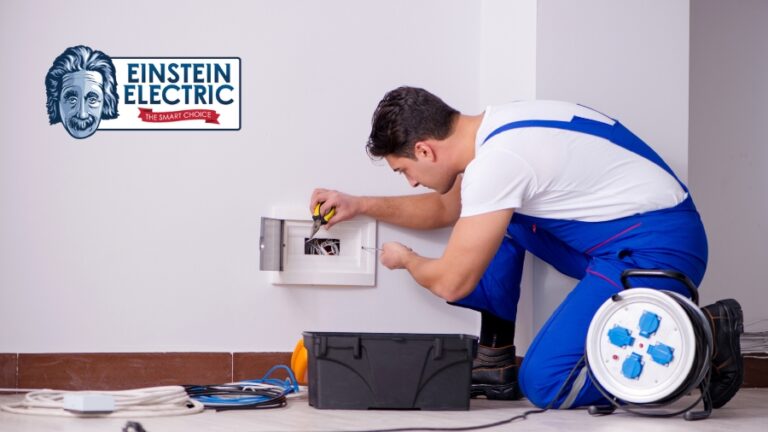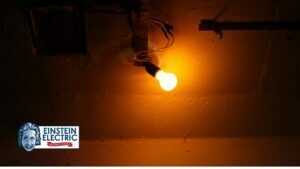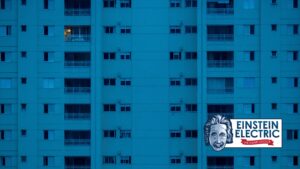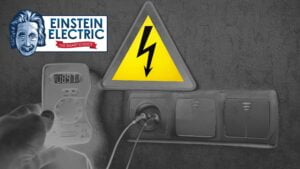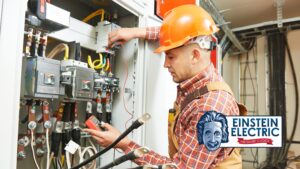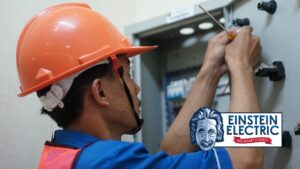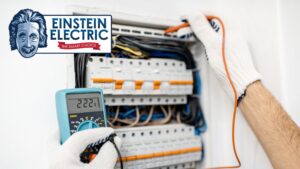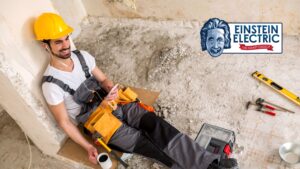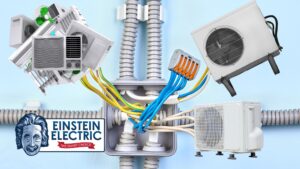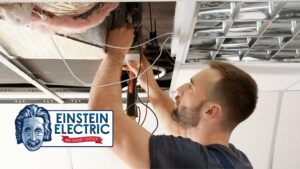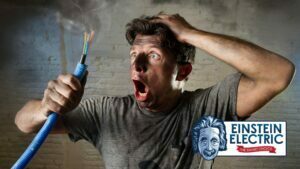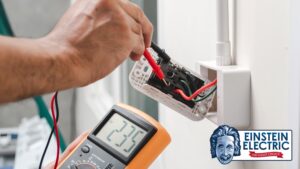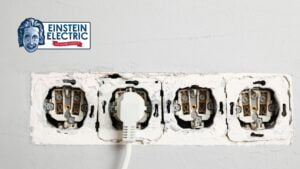As a homeowner, you rely on your electrical system to power your appliances, devices, and other necessities. However, it’s easy to forget that your electrical system requires regular maintenance to function correctly and safely. Electrical problems can lead to fires, electrocution, and other hazards that can cause significant damage to your property or even harm you and your loved ones. In this blog, we will discuss the importance of regular electrical maintenance for your home.
- Improve Electrical Safety
Regular electrical maintenance can improve the safety of your home. Electrical problems are one of the leading causes of house fires, and many of these fires could have been prevented with proper maintenance. Electrical maintenance can identify potential hazards, such as overloaded circuits or faulty wiring, and allow you to address them before they become a safety risk.
Regular electrical maintenance plays a vital role in improving electrical safety in several ways:
- Identifying potential hazards: Through routine inspections and maintenance, electrical professionals can identify potential electrical hazards such as faulty wiring, loose connections, outdated components, or overloaded circuits. By detecting these issues early on, they can be addressed before they escalate into safety risks.
- Preventing electrical fires: Electrical problems are a leading cause of house fires. Regular maintenance allows for the identification and rectification of faulty wiring, overheating components, or other issues that can lead to electrical fires. By addressing these problems proactively, the risk of fire is significantly reduced.
- Ensuring proper grounding: Proper grounding is essential for electrical safety. During maintenance, electricians can check the grounding systems in your home to ensure they are functioning correctly. Faulty or inadequate grounding can increase the risk of electrical shocks or equipment damage, so addressing these issues improves safety.
- Upgrading outdated components: Over time, electrical components can become outdated or worn out, increasing the risk of electrical hazards. Regular maintenance allows for the identification and replacement of outdated or faulty components, such as circuit breakers, switches, or outlets, with newer and safer alternatives.
- Addressing overloads and load balancing: Electrical systems can become overloaded when there is excessive demand placed on a circuit. Regular maintenance enables electricians to assess the load distribution in your home, identify overloaded circuits, and recommend load balancing or additional circuits as needed. This helps prevent overheating, tripped breakers, and potential electrical hazards.
- Enhancing electrical system efficiency: Electrical maintenance involves inspecting and optimizing the overall electrical system. By ensuring that the system is functioning at its best, with proper voltage levels, efficient distribution, and minimal energy wastage, the risk of electrical issues and subsequent hazards is reduced.
- Compliance with safety standards: Regular maintenance helps ensure that your electrical system meets the required safety standards and codes. This is particularly important for older homes or buildings that may have outdated wiring or components that do not meet current safety regulations. Bringing the system up to code through maintenance enhances safety and minimizes the risk of electrical accidents.
Remember, electrical maintenance should be performed by qualified professionals who have the knowledge and expertise to identify potential hazards and make necessary repairs or upgrades. By investing in regular electrical maintenance, you can significantly improve the safety of your home and protect against electrical hazards.
- Extend the Lifespan of Electrical Components
Regular electrical maintenance can also extend the lifespan of your electrical components. By addressing issues early, you can prevent further damage to your system, allowing it to function optimally for longer. Regular maintenance can also help you avoid costly repairs or replacement of your electrical components.
Regular electrical maintenance can extend the lifespan of electrical components in several ways:
- Preventing premature wear: Electrical components, such as switches, outlets, and circuit breakers, can experience wear and tear over time due to regular use. With regular maintenance, these components can be inspected for signs of wear, damage, or corrosion. By identifying and addressing issues promptly, you can prevent further deterioration and extend the lifespan of the components.
- Addressing loose connections: Loose electrical connections can cause arcing, overheating, and damage to the components involved. During regular maintenance, electricians can check for loose connections and tighten them as necessary. By ensuring secure connections, the risk of overheating and component failure is minimized, thereby extending the lifespan of the components.
- Removing dust and debris: Dust and debris can accumulate on electrical components, such as circuit boards or ventilation systems, impairing their performance and potentially causing them to overheat. During maintenance, these components can be cleaned and cleared of any debris, ensuring proper airflow and preventing overheating. This helps to prolong the lifespan of the components.
- Identifying and addressing voltage issues: Fluctuations in voltage levels can be detrimental to electrical components. Regular maintenance allows electricians to measure and assess the voltage levels in your electrical system. If any voltage irregularities are detected, they can be addressed, such as through the installation of voltage stabilizers or surge protectors. By maintaining consistent voltage levels, the stress on electrical components is reduced, resulting in a longer lifespan.
- Upgrading outdated components: During maintenance, outdated or obsolete electrical components can be identified and replaced with newer, more efficient models. Older components may be more prone to failure or may not provide optimal performance. By upgrading to newer components that meet current standards and technology, you can enhance the lifespan and reliability of your electrical system.
- Conducting preventive maintenance: Regular maintenance includes proactive measures to prevent issues and potential failures. Electricians can perform tasks like lubricating moving parts, inspecting insulation, and testing electrical connections. These preventive measures help identify and address minor issues before they escalate into major problems, extending the lifespan of electrical components.
- Ensuring proper load distribution: Overloading circuits or placing excessive demand on electrical components can lead to premature failure. During maintenance, electricians can assess the load distribution in your electrical system and make recommendations to balance the load or distribute it across multiple circuits. By avoiding overloading and optimizing the load, the strain on components is reduced, increasing their lifespan.
By investing in regular electrical maintenance, you can proactively address issues, optimize performance, and ensure the longevity of electrical components in your home or building. A well-maintained electrical system is less likely to experience unexpected failures or premature component replacements, saving you time and money in the long run.
- Reduce Energy Costs
A well-maintained electrical system can also reduce your energy costs. Issues such as faulty wiring or outdated appliances can cause your energy bills to skyrocket. Regular maintenance can identify areas where you can reduce energy consumption, such as replacing outdated appliances or improving insulation.
Regular electrical maintenance can help reduce energy costs in several ways:
- Energy-efficient upgrades: During electrical maintenance, you can assess the energy efficiency of your appliances, lighting fixtures, and other electrical devices. By identifying outdated or energy-intensive equipment, you can replace them with newer, more energy-efficient models. Energy-efficient appliances and devices consume less electricity, resulting in lower energy bills.
- Optimizing lighting: Lighting typically accounts for a significant portion of a home’s energy consumption. During maintenance, you can evaluate your lighting setup and consider switching to energy-efficient options such as LED bulbs. LED bulbs use significantly less energy than traditional incandescent bulbs and can last much longer, reducing both energy consumption and replacement costs.
- Identifying and fixing energy leaks: Electrical maintenance can help identify energy leaks in your home. For example, poorly insulated areas, gaps in windows or doors, or air leaks in ductwork can result in energy loss. By identifying and addressing these issues, such as through improved insulation or weatherstripping, you can reduce the need for excessive heating or cooling, thus lowering energy usage and costs.
- Power factor correction: Power factor is a measure of how effectively electrical power is being utilized. A low power factor can lead to energy waste and increased utility costs. During electrical maintenance, power factor correction can be implemented by installing power factor correction capacitors. These capacitors help optimize the electrical system’s power factor, leading to improved energy efficiency and reduced energy costs.
- Load balancing and optimization: Overloaded circuits can lead to increased energy consumption and higher energy bills. During maintenance, electricians can assess the load distribution in your electrical system and make recommendations to balance the load across multiple circuits. By optimizing the load, you can avoid overloading and excessive energy usage, resulting in lower energy costs.
- Voltage optimization: High or fluctuating voltage levels can lead to energy waste and increased energy bills. During maintenance, electricians can measure and assess the voltage levels in your electrical system. If voltage irregularities are detected, voltage optimization techniques, such as installing voltage regulators or stabilizers, can be implemented. Optimizing voltage levels helps reduce energy waste and promotes efficient energy usage.
- Detecting and repairing energy-consuming issues: Regular maintenance allows for the detection and repair of electrical issues that may contribute to excessive energy consumption. For example, faulty wiring, loose connections, or malfunctioning appliances can lead to energy wastage. By identifying and addressing these issues promptly, you can minimize energy loss and lower your energy costs.
Remember, regular electrical maintenance by qualified professionals is crucial to ensure the safety and efficiency of your electrical system. By addressing energy-related issues during maintenance, you can make informed decisions and take proactive measures to reduce energy costs and promote energy efficiency in your home or building.
- Ensure Compliance with Electrical Codes
Electrical codes exist to ensure the safety and functionality of electrical systems. Regular maintenance can help ensure that your system complies with these codes. Compliance with electrical codes is essential, as it can prevent legal issues and ensure that your home’s electrical system is safe and functional.
Regular electrical maintenance helps ensure compliance with electrical codes in the following ways:
- Inspections: Regular inspections by qualified electricians ensure that your electrical system meets the requirements of electrical codes. These inspections involve thorough assessments of the wiring, components, grounding systems, and overall electrical infrastructure of your home or building. By identifying any deviations from the codes, necessary corrections can be made to bring the system back into compliance.
- Upgrading outdated components: Over time, electrical codes evolve to incorporate new safety standards and technological advancements. Regular maintenance provides an opportunity to identify outdated components that may not meet the current electrical code requirements. By upgrading these components to comply with the latest codes, you ensure the safety and compliance of your electrical system.
- Addressing safety hazards: Electrical codes are primarily designed to prioritize safety. Regular electrical maintenance helps identify potential safety hazards, such as faulty wiring, improper grounding, or overloaded circuits. By promptly addressing these hazards and making necessary repairs or adjustments, you ensure compliance with electrical codes and mitigate the risk of electrical accidents.
- Knowledge of code updates: Electricians who regularly perform maintenance stay updated with the latest electrical codes and regulations. They are familiar with any recent changes or additions to the codes. This ensures that any maintenance or repairs they carry out align with the current standards, maintaining compliance with electrical codes.
- Documentation: Regular electrical maintenance often involves documenting the inspections, repairs, and upgrades performed on your electrical system. This documentation serves as proof of compliance with electrical codes. In case of any future inspections or audits, having comprehensive records of maintenance activities can help demonstrate that your electrical system meets the necessary code requirements.
- Guidance on code compliance: Electricians who perform regular maintenance can provide guidance and advice on code compliance. They can inform you about any specific requirements related to electrical installations or modifications you plan to undertake in your home or building. By consulting with them during the planning stages, you can ensure that your electrical projects adhere to the applicable electrical codes.
By incorporating regular electrical maintenance into your routine, you actively uphold compliance with electrical codes. This not only ensures the safety of your home or building but also helps avoid penalties, fines, or other legal consequences that may arise from non-compliance.
- Increase the Resale Value of Your Home
Regular electrical maintenance can also increase the resale value of your home. Potential buyers are often willing to pay more for homes with well-maintained electrical systems. A properly maintained electrical system can give buyers peace of mind and confidence in their purchase, leading to a higher resale value.
Regular electrical maintenance can contribute to increasing the resale value of your home in several ways:
- Enhanced safety: A well-maintained electrical system signals to potential buyers that the home has been cared for and is in good condition. It provides assurance that the electrical system is safe and reliable, reducing concerns about potential hazards or the need for immediate repairs. This can make your home more appealing and increase its value in the eyes of prospective buyers.
- Compliance with building codes: Electrical maintenance helps ensure that your electrical system meets current building codes and regulations. Compliance with codes is an important factor for buyers as it demonstrates that the home has been properly maintained and meets the required safety standards. Having an electrical system that is up to code can increase buyer confidence and positively impact the resale value.
- Energy efficiency: Regular electrical maintenance allows for the identification and correction of energy inefficiencies in your home. By optimizing the electrical system, upgrading to energy-efficient appliances, or improving insulation, you can reduce energy consumption and lower utility bills. Energy-efficient homes are increasingly desirable to buyers, as they offer long-term cost savings and environmental benefits. Highlighting the energy-efficient features resulting from regular electrical maintenance can positively influence the resale value of your home.
- Modernization and upgrades: Electrical maintenance provides an opportunity to upgrade outdated electrical components and systems. For example, replacing old wiring with modern wiring methods or upgrading lighting fixtures to energy-efficient options can enhance the functionality and aesthetics of your home. Upgrades that improve convenience, efficiency, and technology integration can make your home more attractive to buyers, potentially increasing its value.
- Documentation and peace of mind: Regular electrical maintenance often involves documenting the inspections, repairs, and upgrades performed on your electrical system. Having a comprehensive record of electrical maintenance activities can provide peace of mind to potential buyers. It demonstrates that the electrical system has been well-maintained and can serve as evidence of the home’s overall quality and care, potentially boosting its resale value.
- Negotiating power: When selling a home, being able to present a well-maintained electrical system can give you negotiating power. Buyers may be willing to pay a higher price for a home with a reliable and safe electrical system, as they won’t have to worry about immediate repairs or potential electrical issues. A home with a strong electrical infrastructure can stand out in the market and justify a higher resale value.
It’s important to note that the impact of regular electrical maintenance on the resale value of your home may vary depending on various factors such as location, market conditions, and overall condition of the property. However, prioritizing electrical maintenance can contribute to a positive perception of your home’s value and attractiveness to potential buyers.
What Does Electrical Maintenance Involve?
Electrical maintenance involves a series of checks and procedures designed to ensure that your electrical system is functioning correctly and safely. Here are some examples of what electrical maintenance involves:
- Inspecting Electrical Components
Inspecting electrical components, such as wiring, circuit breakers, and outlets, is an essential part of electrical maintenance. Inspections can identify potential hazards, such as frayed wires or loose connections, allowing you to address them before they become a safety risk.
- Testing Electrical Components
Testing electrical components, such as circuit breakers and outlets, is also an essential part of electrical maintenance. Testing can identify issues such as overloaded circuits or faulty outlets, allowing you to address them before they cause damage or become a safety hazard.
- Upgrading Outdated Components
Upgrading outdated components, such as appliances or electrical panels, is also an essential part of electrical maintenance. Outdated components can cause energy inefficiencies or even safety hazards, and upgrading them can improve the functionality and safety of your electrical system.
- Cleaning Electrical Components
Cleaning electrical components, such as outlets and switches, is also an essential part of electrical maintenance. Dust and debris can accumulate in these components, causing them to malfunction or become safety hazards. Cleaning can help prevent these issues and ensure that your system is functioning correctly.
Conclusion
Regular electrical maintenance is essential for the safety, functionality, and energy efficiency of your home’s electrical system. By addressing potential hazards, identifying issues early, and upgrading outdated components, you can ensure that your system is functioning optimally and safely. Regular maintenance can also help reduce energy costs, ensure compliance with electrical codes, and increase the resale value of your home. If you’re unsure about the safety of your electrical system or need assistance with maintenance, consider hiring
